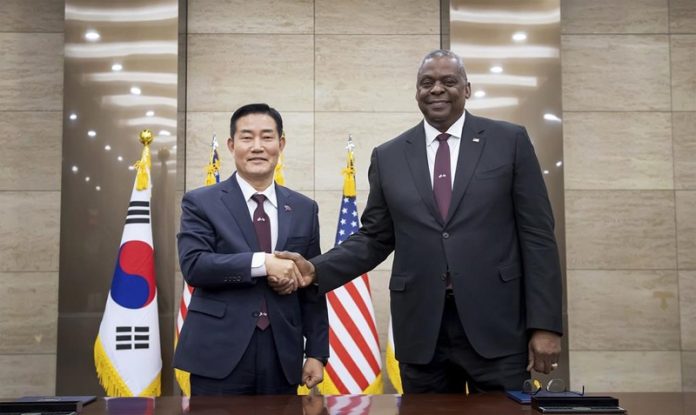SEOUL, Nov 13: The United States and South Korea on Monday updated a bilateral security agreement with the aim of more effectively countering North Korea’s evolving nuclear and missile threats.
The move followed high-level military talks in Seoul, where the allies also discussed enhancing three-way defense exercises with Japan and improving information-sharing on North Korean missile launches.
US Defense Secretary Lloyd Austin was in Seoul for annual security talks with South Korean military officials, including Defense Minister Shin Won-sik, which were focused on boosting nuclear deterrence against North Korea.
They also talked about how the allies could coordinate over broader geopolitical issues, including Russia’s war on Ukraine and China’s regional assertiveness, Austin said.
Tensions between the Koreas are at their highest point in years as the pace of both North Korea’s weapons tests and South Korea’s combined military exercises with the United States have intensified in a cycle of tit-for-tat.
During their Security Consultative Meeting, Austin and Shin signed a new version of their countries’ Tailored Deterrence Strategy agreement, which was revised for the first time in a decade to address the growing threat of the North’s military nuclear program.
Shin said the new document spells out that the United States would mobilize its full range of military capabilities, including nuclear ones, to defend the South in the event of a North Korean nuclear attack. He also said the document will provide a template for the allies to strategize how South Korea could assist U.S. Nuclear operations in such events with its conventional capabilities but didn’t elaborate further.
“Our deterrence commitment to the ROK remains ironclad — that includes a full range of our nuclear, conventional and missile defense capabilities,” Austin said at a news conference, referring to South Korea’s formal name, the Republic of Korea.
Austin said the U.S. Deployments of major military assets to South Korea in recent months, which included a U.S. Nuclear ballistic missile submarine, a nuclear-capable B-52 bomber and aircraft carriers, demonstrated the U.S. Commitment to defense of the South. He said another U.S. Aircraft carrier battle group will travel to the region soon in a further show of force.
Shin said the allies, after conducting their largest-ever live-fire training this year, will continue to further expand their combined military exercises to deter and respond to North Korean threats.
The United States and the government of conservative South Korean President Yoon Suk Yeol have also been strengthening their trilateral security cooperation with Japan, which has included joint military exercises and tightened defense planning, in response to North Korea’s intensifying weapons development and verbal threats of nuclear conflict.
Arriving in South Korea over the weekend, Austin earlier met Shin during a three-way meeting with Japanese Defense Minister Minoru Kihara, who participated in the talks through online video. They agreed to start as planned a real-time information sharing arrangement on North Korean missile launches in December. They also agreed to set up multiyear plans in coming weeks to enhance their trilateral military exercises, South Korea’s Defense Ministry said.
Austin also on Sunday met Yoon, who expressed satisfaction over the increased consultations with Washington over nuclear deterrence plans and the more frequent deployment of advanced U.S. Military assets to the Korean Peninsula in past months, which he described as crucial for keeping the North’s nuclear and missile threats in check.
Yoon also stressed that the allies should be prepared for any type of provocation by the North, including a “Hamas-style surprise attack,” and insisted that North Korea was “directly and indirectly” involved in Russia’s war on Ukraine and the clashes between Israel and Hamas, according to his office.
The North’s Foreign Ministry on Monday criticized the planned meeting, calling it a “dangerous scheme to ignite a new war of aggression” against the North.(AP)


